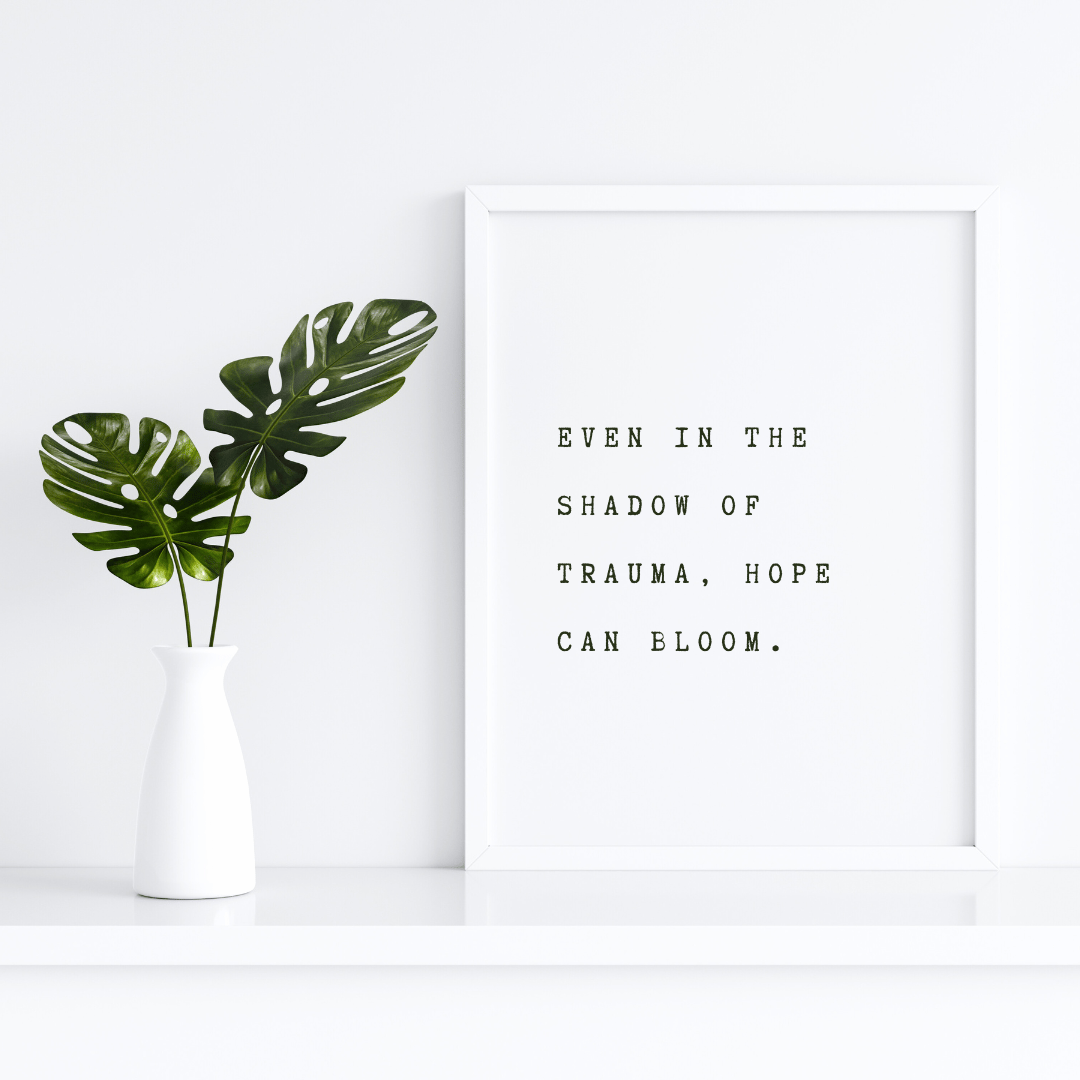Trauma Counselling
Are you experiencing persistent feelings of sadness, anxiety, or numbness? Do certain situations trigger overwhelming emotions that are difficult to manage? Do your emotions go from 0 to 100 in a matter of seconds? Do you sometimes feel like a part of you is frozen in the past? Have you been experiencing unexplained physical symptoms? Do you find yourself relying on avoidance, substance use, or other less healthy strategies? These symptoms often indicate trauma; we’re here to help you heal.

Our approach to Trauma treatment
Evidence-based therapies
We use therapies such as Internal Family Systems Therapy, EMDR therapy and somatic therapies proven to be effective in trauma treatment.
Certified in Clinical Trauma Treatment
Over the years, we’ve witnessed the detrimental effects when clients work with clinicians lacking specialized training in trauma treatment. Being a Certified Clinical Trauma Professional, my training equips me to provide effective support. I have had the privilege to have trained with some of the best in the field of trauma, such as Bessel van der Kolk, Gabor Mate, Janina Fisher and Frank Anderson.
A holistic approach
Our approach encompasses working with emotions, body and thoughts. we recognize that healing from trauma goes beyond merely changing a client`s thoughts. We will help you process emotions, foster a sense of safety within your body, and address maladaptive thought patterns.
Helping you rewrite your story
Trauma can fundamentally alter how we view our life narrative. We will work on reshaping the old beliefs that you might be carrying as a result of your trauma and help you rewrite your story
Fostering new coping strategies
Trauma can lead to us developing unhelpful coping strategies. Trauma treatment involves recognizing those coping strategies and learning new ways of dealing with strong emotions and difficult situations

“Traumatized people chronically feel unsafe inside their bodies: The past is alive in the form of gnawing interior discomfort. Their bodies are constantly bombarded by visceral warning signs, and, in an attempt to control these processes, they often become expert at ignoring their gut feelings and in numbing awareness of what is played out inside. They learn to hide from their selves”
Bessel van der Kolk
What is trauma?

Signs of trauma?
THE IMPORTANCE OF ACKNOWLEDGING TRAUMA SYMPTOMS
Acknowledging trauma symptoms is the first step towards healing. Within this acknowledgement lies hope, power and the possibility for change.
Coping Mechanisms:
If you find yourself relying on avoidance, substance use, or other less healthy coping strategies, it could be a sign of underlying trauma. When faced with overwhelming emotions or reminders of past trauma, it’s common for individuals to employ coping mechanisms as a way to manage their distress. Avoidance tactics, such as avoiding certain places, people, or activities that trigger painful memories, may provide temporary relief but can ultimately perpetuate feelings of isolation and disconnection.
Persistent Fear and Anxiety:
Persistent fear, characterized by an ongoing sense of dread or anxiety that seems disproportionate to one’s current circumstances, can be a debilitating symptom of unresolved trauma. Individuals who have experienced trauma may find themselves constantly on edge, anticipating danger even in situations where there is no immediate threat. This hyper-vigilance can disrupt daily functioning, leading to difficulty concentrating, disturbed sleep patterns, and strained relationships.
Flashbacks and Intrusive Memories:
Flashbacks and intrusive memories, vivid and distressing recollections of past events that intrude into one’s thoughts unexpectedly, are common symptoms of trauma. These experiences can be overwhelming, causing individuals to feel as though they are reliving the traumatic event, even though it may have occurred in the past. Addressing flashbacks and intrusive memories as symptoms of trauma involve developing strategies to manage and reduce their frequency and intensity.
Avoidance Behaviors:
Self-Worth and Self-Image:
Traumatic experiences can profoundly impact how we perceive ourselves and our value in the world. You might question your worth or feel undeserving of love and respect. These feelings can stem from internalized messages or beliefs formed during the traumatic event, leading to a negative self-image and diminished self-esteem. Addressing self-image and self-worth issues as a result of trauma involves exploring the underlying beliefs and emotions that contribute to these feelings.
Changes in Relationships
Impact on Daily Functioning:
Physical Symptoms:
If you are experiencing unexplained physical symptoms, such as headaches, digestive issues, or muscle tension, it could be a sign of unresolved trauma. Traumatic experiences can manifest not only as psychological distress but also as physical symptoms as the body reacts to stress and emotional pain. These physical symptoms may seem unrelated to the traumatic event but can serve as a somatic expression of underlying trauma. For example, chronic headaches or gastrointestinal problems may develop as a result of prolonged stress or hypervigilance. Additionally, muscle tension and other somatic complaints may reflect the body’s attempt to contain and cope with overwhelming emotions.
Sleep Disturbances:
ADVANCED INTEGRATIVE TRAUMA THERAPY
With years of experience and specialized training in trauma therapy, I integrate approaches like Internal Family Systems (IFS), Eye Movement Desensitization and Reprocessing (EMDR), and Accelerated Experiential Dynamic Psychotherapy (AEDP) to aid clients in trauma recovery. Through IFS, clients integrate fragmented aspects of themselves, while EMDR processes traumatic memories, and AEDP fosters emotional processing. I tailor these evidence-based techniques to suit each client’s needs.
“The attempt to escape from pain, is what creates more pain.”
THE STEPS INVOLVED IN YOUR THERAPY PROCESS
- Schedule a complimentary consultation.
- Book your first session to kickstart your therapy process if we resonate with you.
- Keep in mind that therapy isn’t a quick fix; consistency is vital for positive outcomes.
- Reflect on sessions and apply insights for maximum therapeutic benefits.
- Communicate what works and what doesn’t; therapy is a collaborative process.
Different types of trauma
Acute trauma
Complex/chronic trauma
Developmental trauma
Post-traumatic stress disorder (PTSD)
Secondary or vicarious trauma
FAQ
What is trauma?
What is complex trauma?
What happens if I don`t address my trauma?
Am I overreacting or am I really traumatized?
It is normal for trauma survivors to believe their reactions are extreme. Minimizing our trauma and invalidating our feelings are ways in which we try deal with painful emotions. It is important to remember that denying our emotional experiences and labelling them as “overreaction” can lead to shame, isolation, and other mental health issues.
Can talking about trauma make me feel worse?
Is therapy effective for healing for trauma?
I have been to therapy before, and it did not help. Why should I try again?
Everyone experiences trauma. Why should I seek therapy?
I get triggered easily. Is that a sign of trauma?

About Roya Counselling
At Roya Counselling, we are committed to providing professional, ethical, and evidence-based counselling services that prioritize your well-being. We understand that seeking therapy can be a difficult and brave decision, and we honor the trust you place in us. We have personally experienced the transformative power of therapy, and we will never take your desire for healing lightly.
More
We feel very privileged to hear about our clients’ hopes, goals and pains and witness them slowly recovering their peace, happiness and livelihood.
